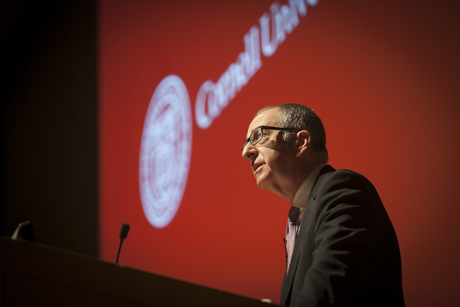Thought leadership, innovation focus of Skorton address
By Nancy Doolittle

Reflecting on thought leadership and innovation in his State of the University Address, President David Skorton said that Cornell University needs to think “strategically and boldly,” and advocate for partnerships that ensure universities continue to serve society “through science and technology, through the humanities and social sciences, and through the arts – and, most importantly, through the development of the next generation of thought leaders.”
“Recruiting promising students, faculty and staff, setting the conditions for their success, and following an ever-more strategic vision of the needs of our society and world are our most urgent imperatives,” Skorton said, speaking Oct. 25 in Statler Hall to an audience of about 700 members of the Cornell Board of Trustees and Cornell University Council.
With an applicant pool of nearly 40,000 students this year, Cornell is recruiting students from increasingly varied backgrounds, Skorton said. It ranks as the eighth most economically diverse national university according to U.S. News and World Report, and one-fifth of Cornell’s student body is composed of international students. The university now must make sure it meets the needs of students whose personal and family experiences and expectations may differ from those of years past, Skorton said.
Innovation also comes from research and creative pursuits. Universities are successful in this realm because they enjoy academic freedom and want to connect with the world beyond campus, Skorton said, applauding the work of Cornell’s newest MacArthur Fellows: Craig Fennie, assistant professor of applied and engineering physics in the College of Engineering, and Sheila Nirenberg, associate professor of physiology and biophysics at Weill Cornell Medical College.
Skorton cited two partnerships that illustrate Cornell’s direct participation in innovation: a collaboration of Weill Cornell, Memorial Sloan-Kettering Cancer Center, The Rockefeller University and Takeda Pharmaceutical Co. to expedite early-stage drug development, and the new master’s program in connective media that will be offered through the Joan and Irwin Jacobs Technion-Cornell Innovation Institute to train entrepreneurial engineers and technologists to drive the digital transformation of publishing, advertising, news, information and entertainment.
Agricultural research is a critical area of concern, he said, citing the work of Professor Chris Barrett, the new director of the Dyson School of Applied Economics and Management who led in the creation of the partnership between the universitywide Atkinson Center for a Sustainable Future and CARE, the international development organization fighting poverty.
Federal funding in agriculture, as in all areas, is decreasing, Skorton said, adding that universities need to advocate for “continued support of the federal government and philanthropy for research of great potential significance.”
However, investment in science won’t solve the world’s problems if cultural differences are not respected, understood and engaged, Skorton said. Long an advocate of the value of a broad liberal education, the humanities and social sciences, Skorton made a special point to talk about recent achievements in the arts.
For example, Caroline O’Donnell, the first Richard Meier Professor of Architecture, recently won the competition for the Museum of Modern Arts Young Architect’s Program; graduates of Creative Writing’s MFA program have enjoyed success as writers; and Eric Nathan, DMA ’12, earned the Frederic A. Juilliard/Walter Damrosch Rome Prize in the 117th annual Rome Prize Competition last spring.
“The need for fresh thinking and new alliances has never been greater,” Skorton said. He affirmed that as Cornell looks to its sesquicentennial, it is ready to meet the future: “Visionary and practical, drawing strength and perspective from all fields; adept at forging partnerships – across campuses, sectors, continents; and open and accessible to the brightest minds in all parts of the world: That is our Cornell.”
Media Contact
Get Cornell news delivered right to your inbox.
Subscribe